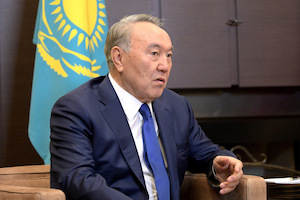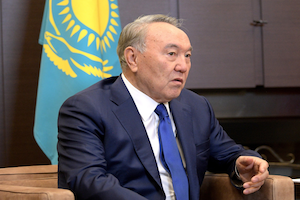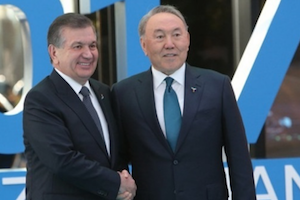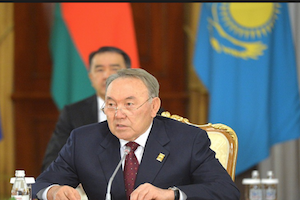Why Kazakhstan's Presidential Elections Matter
By Rafis Abazov
May 23, 2019, the CACI Analyst
The resignation of Kazakhstan’s President Nursultan Nazarbayev in spring 2019, after 30 years of uninterrupted stewardship, had an unexpected timing. However, even more unexpected was the Parliament of Kazakhstan’s hastily announced early presidential elections scheduled for June 9, 2019. Even some major political insiders were caught unprepared. Indeed, leading local analyst Sergei Domnin of Expert Magazine wrote that the entire political establishment woke up to find Kazakhstan at a political “crossroad.” Some believe that the elections are just a face change and that the ruling elite will continue to pursue the same policies. Others claim that the elections could lead to the emergence of an “entirely new political model.”

Kazakhstan's President Resigns at a Moment of Political Tension and Uncertainty
By Natalia Konarzewska
March 22, 2019, the CACI Analyst
In February 2019, Kazakhstan saw a wave of protests triggered by various social and economic grievances. Rallies burst through the country in multiple locations, indicating that popular distress is strong and unlikely to fade soon. In an attempt to placate social discontent, President Nursultan Nazarbayev fired the government, citing its inability to improve living standards and announced his own plan to provide social relief for the families. Kazakhstan’s hydrocarbon-dependent economy is struggling to recover after the 2014 plunge in oil prices and the spillover effects of Western sanctions against its largest trade partner Russia. On March 19, president Nazarbayev announced his immediate resignation after ruling Kazakhstan for thirty years.

Regional Cooperation in Central Asia: Relevance of World Models
By Svante E. Cornell and S. Frederick Starr
December 4, 2018, the CACI Analyst
Central Asian states are embarking on a new effort to build regional cooperation. In March 2019, the second yearly summit of Central Asian leaders will be held in Tashkent. Discussions are under way to provide structure to this newfound regionalism. Central Asians can build on a relatively rich experience of regional cooperation two decades ago, which culminated in the Central Asian Cooperation Organization (CACO). As they take this experience to new levels, they do not need to reinvent the wheel: an overview of other global models of regional cooperation shows how other states in similar situations – particularly Southeast Asian and Nordic countries – have managed to build long-term sustainable regionalism in difficult geopolitical circumstances.

Project "ASTANA": Signs of Demographic Upheaval?
By Rafis Abazov
July 10, 2018, the CACI Analyst
On the eve of the 20th anniversary of moving Kazakhstan’s capital from Almaty to Astana, the country’s government announced that the city of Astana has welcomed its one-millionth resident. Indeed, this was a remarkable achievement for the city, which within just 20 years – between 1997 and 2018 – grew from a population of only 290,000 to more than 1.1 million inhabitants, or more than 300 percent. Kazakhstan’s President Nursultan Nazarbayev envisions that the population of Astana could exceed three million by 2050. Therefore, the main question is whether Kazakhstan can sustain this rapid urbanization shift without facing major social and demographic upheaval.

Proposed changes to Tajikistan's constitution will strengthen Rahmon family's grip on power
By Edward Lemon
February 29th, 2016, The CACI Analyst
Having outlawed the country’s leading opposition movement, the Islamic Renaissance Party, in 2015, President Rahmon is seeking to further cement his position. On December 9, the Tajik parliament unanimously passed a new law naming him “leader of the nation” and “originator of peace and national reconciliation.” This effectively lifts him above the law, guaranteeing impunity for him and his family. On January 13, parliament backed amendments to the constitution, lowering the age limit for presidential candidates to 30. This would allow Rahmon’s eldest son, 28-year-old Rustam, to run in the next election scheduled for 2020. Further amendments to the constitution, which will fully legalize Rahmon’s new position and pave the way for him to rule indefinitely, will be put to a referendum in the coming months.



